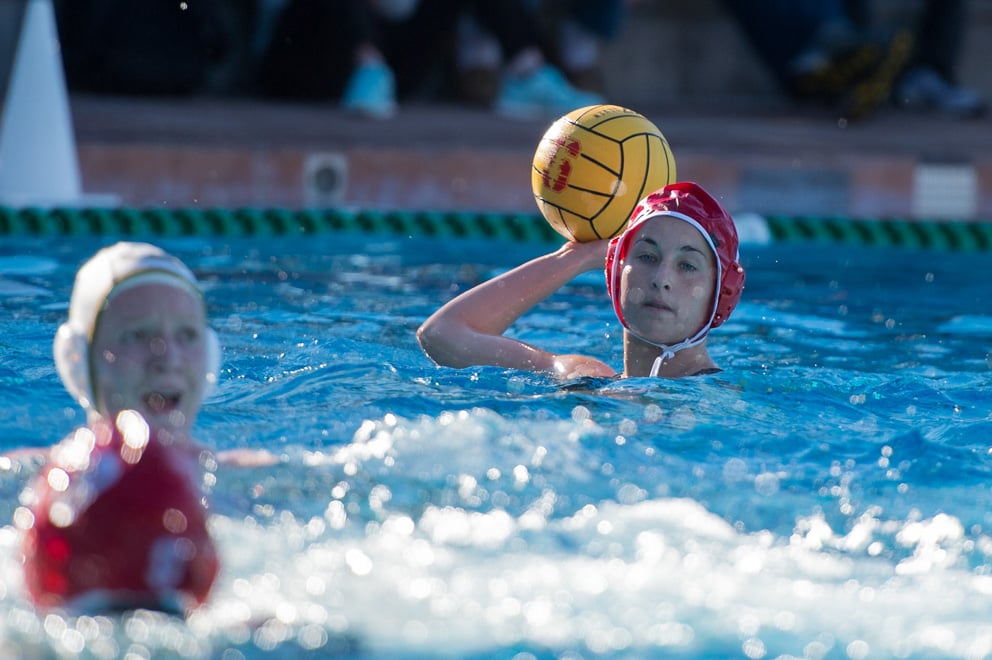With the postseason now upon us, a famous sports mantra comes to mind: defense wins championships. For the Stanford women’s water polo team, this is no exception. Though it is easy to get swept up in offensive flash, lighting up a scoreboard with 20 points and racking up hat tricks, the stingy Cardinal defense has been an integral part of the team’s success this season.
Goals are hard to come by against Stanford. Even in the team’s only loss this season, the UCLA Bruins managed to net only 7, while the most the Cardinal have allowed overall is 9 in their overtime win against No. 3 USC.
The Cardinal defense is a perfect representation of the team’s greatest strength: teamwork.
“Defense is all about the team in water polo,” said sophomore Cassidy Papa. “Technically, there are positions and whatnot, but each person is responsible for more than just the player they are guarding.”
This style of defense is well-suited to the Cardinal, who are characteristically selfless on both sides of the tank.
Yet good team defense starts at the individual level.
“Every person has to focus on their fundamentals in one-on-one defense, like shot-blocking,” explained sophomore Sophia Monaghan.
The logic here is pretty clear: If the other team isn’t shooting, it isn’t scoring. But an important facet of defensive water polo is that it never ends. Because water polo is a fluid sport and doesn’t have the stop-and-go offensive and defensive possessions like football, the team always has to be playing defense.
“Even on offense, you need to be thinking about what’s going to happen next,” said sophomore Jamie Neushul.
This anticipatory ability doesn’t happen overnight, however. The team devotes massive amounts of time to their mechanical and situational defense. Practices usually feature both full-strength and man-down defensive drills. Though most teams would view five-on-six situations as a disadvantage, Stanford embraces them.
“We love being down a man,” Neushul said. “We get very excited about trying to figure out how to solve problems and the most efficient way to do so.”
The importance of strong defense only increases coming into MPSF post-season play. The MPSF is without a doubt the strongest conference in college water polo, with the national championship title not leaving the conference in over a decade. While Stanford has easily handled most of its opponents, No. 2 UCLA and No. 3 USC are always tough competitors and threaten to derail the Cardinal’s hopes of a repeat championship.
Defending against the top teams in the country is no small task. UCLA had three straight 20-point annihilations earlier this season, and USC has shattered scoreboards with four games recording 30 or more points (including three straight in the span of two days). This awesome offensive capability will be gunning for the Card in the MPSF tournament, but it’s nothing Stanford hasn’t seen before.
“Playing teams repeatedly doesn’t change our defense,” Papa asserted. This is a hallmark of Stanford water polo: Play how you play, no matter who you’re playing.
However, Monaghan acknowledged that playing such strong teams repeatedly allows the Cardinal defense to get to know their shooters and adapt.
“If they score a bunch of goals, then we know for next time to make sure they don’t get this opportunity again [and make them] shoot from somewhere they’re less familiar or comfortable with or use a different shooter altogether,” Monaghan said.
Despite all the focus on playing solid, tactical defense, defense can be a highly emotional part of the game.
“Defensive stops can completely change the momentum of the game,” Papa said.
“If we shut down a great team and give ourselves an offensive opportunity, that can do a lot for momentum,” Monaghan added.
Both the mental and physical components of defense will certainly play key roles as Stanford goes head to head with some of the top names in the country this weekend during the MPSF tournament and in the NCAA tournament. The Cardinal will take on the winner of the Cal versus ASU matchup in the semifinals of the conference tournament. The game will take place Saturday, April 25 at 2:30 p.m. in Tempe, Arizona.
Contact Carlie Tenenbaum at carliet ‘at’ stanford.edu.
